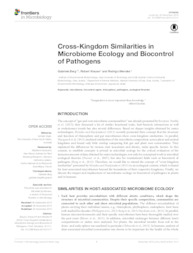Cross-kingdom similarities in microbiome ecology and biocontrol of pathogens.
Cross-kingdom similarities in microbiome ecology and biocontrol of pathogens.
Author(s): BERG, G.; KRAUSE, R.; MENDES, R.
Summary: Abstract: The concept of "gut and root microbiota commonalities" was already presented by Ramírez-Puebla et al.(2013); they discussed a lot of similar functional traits, host-bacteria interactions as well as evolutionary trends but also several differences. Based on deeper insights obtained by omics technologies, Mendes and Raaijmakers (2015) recently presented their concept that the structure and function of rhizosphere and gut microbiomes showcross-kingdom similarities. In parallel, Hacquard et al. (2015) analyzed similarities of the microbiota composition across plant and animal kingdoms and found only little overlap comparing fish gut and plant root communities. They explained the differences by various start inoculants and abiotic, niche-specific factors. In this context, to establish concepts is pivotal in microbial ecology for the critical evaluation of the immense amount of data obtained by omics technologies, not only for conceptual work in microbial ecological theories(Prosseretal.,2007), but also for translational fields such as biocontrol of pathogens (Bergetal.,2013). Therefore, we would like to extend the concept of "cross-kingdom similarities" presented by Mendes and Raaijmakers (2015) to an ecological context, which is shared for host-associated microbiomes beyond the boundaries of their respective kingdoms. Finally, we discuss the impact and implications of microbiome ecology on biocontrol of pathogens in plants and in humans.
Publication year: 2015
Types of publication: Journal article
Unit: Embrapa Environment
Observation
Some of Embrapa's publications are published as ePub files. To read them, use or download one of the following free software options to your computer or mobile device. Android: Google Play Books; IOS: iBooks; Windows and Linux: Calibre.
Access other publications
Access the Agricultural Research Database (BDPA) to consult Embrapa's full library collection and records.
Visit Embrapa Bookstore to purchase books and other publications sold by Embrapa.

